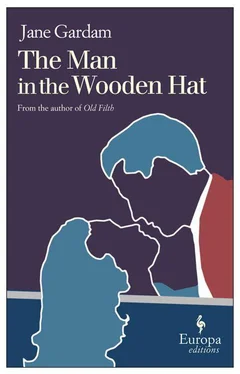“Nothing,” she said.
In the car that they had parked outside the station that morning but a thousand years ago, she said, “I saw Albert Ross. Standing on the platform. Waiting for the train from Plymouth to go through.”
Filth was negotiating Berrywood Lane — a tractor and two four-by-fours, two proud girls on horseback — and said, “You fell asleep.”
“No. He looked straight at me.”
There, on the hall table, lay the tulip bulbs.
I’ll wait till I’ve planted them, she decided. I can’t leave them to shrivel and rot, and she took off her shoes and climbed the stairs to bed. I’ll tell him tomorrow after lunch.
She was up early, not long after dawn, and ready in her gardening clothes. She would change later, after she had packed. It was a damp, warm day, perfect for planting and she arranged the bulbs in groups of twenty-five for lozenge-shaped designs each in a different colour along the foot of the red wall. The planting round the apple trees was finished already. With her favourite long dibble, she began to make a hole for each bulb. She liked to plant at least six inches down. Then you could put wallflowers on top of them to flower first, but this year she had left it a bit late for that. She humped herself about on the planting mat, put a little sharp sand in the bottom of each hole, laid a bulb ready beside each. How stiff and cumbersome her body was now. How ugly her old hands, in the enormous green gloves. A hectic sunlight washed across the garden and she went into the house for a mug of coffee. Edward was in the kitchen, silent in his own world.
“Bulbs finished yet?”
“Not quite.”
She went back to the garden and he followed her, carrying his stick and binoculars on to the terrace. She stood with her coffee, and all at once the rooks started a wild tumult in the ash trees: some dreadful disagreement, some palace revolution, some premonition of change. They began to swoop about above the branches and their ramshackle great nests, all over the sky, like smuts flying from a burning chimney. She was down the garden on her knees again now and saw that Veneering’s pearls were lying in the flower bed beside her. For the first time in her life she had forgotten to take off a necklace when she went to bed. Nor had she noticed them when she washed and dressed this morning. They must have slipped from her neck. She was eye to eye with them now, on her haunches, head down. She picked them off the soil and let them pour into one of the holes for the tulips.
My guilty pearls, she thought. I hope the sharp sand won’t hurt them.
She had rather seized up now. She was in a difficult position on hands and knees. If I can get on my elbows. . she thought. Goodness—! Here we go. Well, I never was exactly John Travolta. That’s better. Now the bottom half.
She rested, and from her lowly place noticed out on the lawn how the bindweed was piercing the turf, rising in green spirals, pirouetting quite high, seeking something on which to cling. The wild, returning to the garden.
She could see Filth, too, sitting on the terrace with his coffee, staring up at the rooks through his binoculars. Then he put down the binoculars and picked up his Airedale-headed walking stick and, quite oblivious of her, like a child, pointed it up at the rookery and shouted, “Bang, bang, bang.” Then he swung the stick about for a left and a right. “Bang, bang, bang.”
He’s quite potty, she thought. It’s too late. I can’t leave him now.
But then she did.
Filth, letting his binoculars swoop away from the rookery and down across the garden a minute later, saw her lying in the flower bed, particulary still.
Three years later — the years Edward Feathers saw as his torture and suffering and the village called his fortitude — came the extraordinary news that the house next door to Dexters, the monstrous hidden house above him, had been sold.
One winter’s day, a single van arrived and was quickly away again. Who had bought the upper house nobody knew. After a time Edward Feathers, on his morning constitutional to the lane end to collect his Daily Telegraph from the length of drainpipe attached to the rough handrail at the foot of the slope, saw that a second bit of drainpipe had been fastened to the handrail of his new neighbour across the lane. The paper was not the Daily Telegraph . It was thicker and stubbier and from what he could see it was the Guardian .
How insolent! To copy his invention for a rainproof newspaper without his permission! He marched off on his emu legs, chin forward, plunging his walking stick into the road. He met his neighbour Dulcie, bright and smiling as usual. When he had slashed his way by she said to her dog, “So — what’s the matter with him today?”
She did not know what was to come.
About a month after the newcomer’s arrival a new telephone was installed (the Donheads move slowly) and the newcomer used it to telephone the village shop in a more distant Donhead. He thanked them for the delivery of his daily paper and would the shop kindly put up a postcard in their window advertising for daily help? What was the going rate? Excellent. Double it. And stipulate laundry. The newcomer had lived in the Far East and was ashamed to say that he was totally incapable of looking after himself.
“Oh, dear me,” they said. “And no wife, sir?”
“My wife is dead. She was Chinese. I’m afraid she had no idea how to do laundry either. We had servants.”
“We’ll do our best,” said the shop. “You sound just like your neighbour. He was from Singapore-way. He’s a lawyer.”
“Oh.”
“What name shall I put on the card, sir? Perhaps you are a lawyer, too?”
“Yes, I am, as it happens.”
“Well, fancy that. You may be friends.”
“My name is Veneering.”
“Your neighbour is Sir Edward Feathers.”
There was a terrible silence. The telephone was put down. “Funny one we’ve got now,” said the shop to Eddie Feathers’s daily who was in buying marmalade for him. “Not a bundle of fun.”
“Makes two of them,” said Kate, and half an hour later, letting herself into the Feathers domain, “What about this, then? Next door it’s another lawyer and he’s from Singapore-way, too. His name’s Veneering. That’s a queer name if ever. Is it Jewish? He’s wanting a domestic, and don’t you worry, I’ve said I’m not available. There’s enough to do here. I’ll find him someone but — Sir Edward, what’s wrong? You’ve turned greenish. Sit down and I’ll get you your cup of tea.”
Feathers sat silent, stunned out of thought. At last he said, “Thank God that Betty is dead.”
Over the way Veneering sat on by the telephone for a long while and said at last, “I must move. Thank God that Betty is dead.”
After a time looking at his fire, burning brightly in the great chimney, Feathers also said, “I must move.”
A bombshell coincidence?
Yet it was really not so very unlikely that Veneering had lighted on this particular house. The Donheads are thick with retired international lawyers, and house agents’ blurbs do not always mention English county boundaries. Dorset is large and, anyway, Veneering had no idea of the Featherses’ address. He was not the detective his son had been. No, the only really curious thing was that after their mutual discovery they never met. Filth, far too proud to change the route of his afternoon walk, kept to the same paths as before, went to church as before, drove to the same small supermarket as before, kept the same friends. It was Veneering who kept himself out of sight. He was, quite simply, never about. Cases of wine were delivered at quite frequent intervals and the village shop would drop off meagre groceries on his porch up the hill. His cleaner came when she felt like it and reported that he was obviously someone “in reduced circumstances” and his garden was left to go wild. Sometimes a hired car would come out from the station to take him to the London train and drop him at home again after dark. Later, it was reported that the circumstances could not have been that much reduced for the hired car began to transport him all the way. When people called at the house with envelopes for Save the Children or Breast Cancer, they were ignored. The postman said he delivered very little up there. There was seldom a light.
Читать дальше












